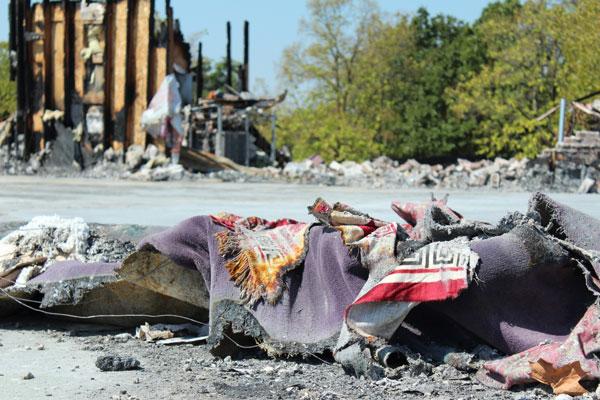JOPLIN, Mo. — When the mosque here on the outskirts of town burned to the ground on Aug. 6, the imam’s 4-year-old son knew what to do.
He wanted to build another.
After all, that’s what his family had done with their home after it was destroyed by the tornado that tore through the town a little more than a year earlier.
The imam's family has a new home, but the wait for a new mosque is going to take a while.
A little more than a month after the Islamic Society of Joplin mosque was destroyed by fire, the local Muslim community is moving forward with support from the interfaith community.
But progress is slow.
For now, one mosque member has opened up his home for prayers and gatherings. There are about 40 families in the Muslim community, but not everyone comes for all the prayers. The most crowded time is Fridays, when about 30 or 40 people gather.
There’s no timeline for construction yet, and no structural plans. The basic need is a worship space, but the old building also had areas for teaching and social activities.
“It is the center for everything,” said Imam Lahmuddin, the mosque's imam.
When the time does come to rebuild, the Islamic Society of Joplin will have financial backing from across the country. An online fundraiser for a new building has raised more than $400,000, surpassing the $250,000 goal.
Where the new mosque will be built remains a question. Some members think the new mosque should be at the same site – along a quiet road outside the city limits. Others think it should be built somewhere else, closer to the heart of the city. Safety is among the considerations.
Lahmuddin said he can’t speak for everyone in the Muslim community, but he’s never felt threatened in Joplin. People have made negative comments about Islam, and a few years ago, the sign in front of the mosque was burned. Still, for the most part, he said Joplin is the kind of town where people passing by the mosque waved and smiled.
But the fire that destroyed the mosque followed an arson attempt on July 4, when someone tried to set the roof on fire. The mosque security camera captured an image of a suspect, but the FBI is still investigating and has not found the suspect yet. The FBI and the Bureau of Alcohol, Tobacco, Firearms and Explosives are offering a $15,000 reward for information leading to an arrest and conviction.
The two incidents haven’t been officially connected, and the FBI is still investigating the August fire.
Although the August fire has not been confirmed as arson, it happened in the midst of attacks throughout the nation targeted at Muslims. The Council on American-Islamic Relations in St. Louis cited nine attacks in 10 days.
Mark Statler, a pastor at St. Paul's United Methodist Church in Joplin, said the fire came as a blow to the city – especially after the way the community rallied together in the aftermath of the 2010 tornado.
“It kind of shattered this illusion that we were this strong, unified, all-on-the-same page-kind of community,” he said.
Although the fire itself shattered what Statler called the “we are Joplin” mentality, the response has reinforced the sense of community.
To Lahmuddin, the fire isn’t what the “real Joplin” is – the real Joplin is the support the Islamic community has received from people of different faiths.
The Saturday night before the mosque fire, people from a few different churches gathered at the mosque to break the Ramadan fast for the night.
Less than 48 hours later, Lahmuddin’s phone rang just before 4 a.m. as he was preparing his morning meal. When he saw the call was from the sheriff’s department, he knew something had to be wrong at the mosque.
Statler’s congregation members wrote encouraging notes and delivered a basket of cards to the Islamic community. Another congregation, St. Philip’s Episcopal Church, hosted an interfaith meal. When Ramadan ended, about 300 people from five different churches gathered with the Muslim community at a hotel convention center to celebrate.
A group of religious leaders signed a full-page advertisement of support in The Joplin Globe, the local newspaper.
Jill Michael, a pastor at South Joplin Christian Church, said many of the Christian leaders involved in the advertisement have divisive doctrinal differences, yet they came together for the Islamic community.
Some churches posted the words “love thy neighbor” on their signs. Sojourners, a national Christian social justice organization, threw in its support with an electronic billboard message: “Love your Muslim neighbors.”
Kellie Kotraba is the editor of ColumbiaFAVs.com. Via RNS.
Got something to say about what you're reading? We value your feedback!
